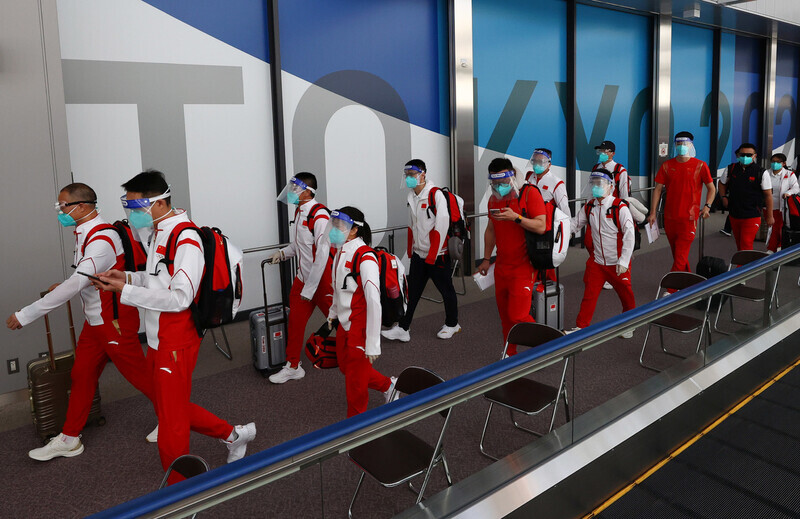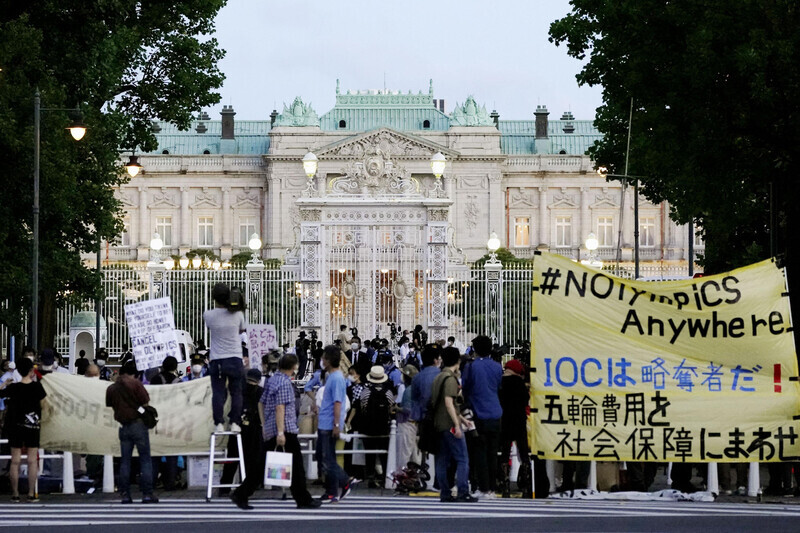hankyoreh
Links to other country sites 다른 나라 사이트 링크
Japan's "quarantine bubble" for Olympics could burst any minute

With the 2020 Tokyo Summer Olympics just four days away, fear is rising with COVID-19 cases reported at the athletes' village. Japan has pledged a safe and secure competition, but holes have appeared in its quarantine system even before the opening ceremony.
The Tokyo Organizing Committee of the Olympic and Paralympic Games on Sunday said two athletes at Tokyo Olympic Village tested positive for COVID-19, the first cases reported at the facility. This was after the committee confirmed the day earlier that an Olympic staff member had tested positive. Thus, the number of infections related to the games rose to 55.
Understandably, Japan is in a state of anxiety. The daily Mainichi Shimbun on July 18 said a phone survey of 1,087 voters nationwide conducted the day before found that 65% believe Prime Minister Yoshihide Suga's pledge of a "safe and secure hosting of the Olympics" is impossible. Just 19% said the opposite.
The organizing committee and the Japanese government have pledged a "quarantine bubble" for the games based on the "Orlando bubble" model used by the US National Basketball Association (NBA). Last year, the NBA held its playoffs at Disneyworld in Orlando, Florida, in isolation from the outside world. This inspired the Japanese media to use the term "quarantine bubble," as they likened it to water droplets.
The committee has taken a variety of measures toward hosting a "bubble Olympics." For example, participants entering Japan are taken by a committee-provided taxi to their hotels for three days of isolation. They cannot take public transportation or have non-essential contact with people in Japan for two weeks. For this purpose, five apps allowing tracking of a person's location must be installed upon their entry to Japan.

The problem is that the committee has no practical way of controlling participants. With an estimated 15,000 participants from 205 countries taking part in the Olympics, cases have already been reported at the athletes' village. Other participants like media personnel and volunteers raise the number higher, but they lack quarantine rules, let alone places to gather. The committee has assigned guards at hotel entrances, but recognizing guests can prove difficult. At one hotel, one could not get related information until after identifying oneself as an Olympic participant to a guard.
The situation was different in Orlando. At the time, 22 NBA teams were in the playoffs. Disneyworld, with plenty of resorts inside, could limit the space and radius of activity by participants, handling accommodations and dining internally and separating participants from people outside of the bubble. Thus, the league could complete its season with no additional infections.
The committee recently sent an email on the quarantine problem to the COVID-19 liaison of every delegation, warning of strong action against violators of COVID-19 rules. Though the email said, "Japanese media recently reported seeing an Olympic official drinking late at night in Tokyo. We will take tough measures against anyone who is caught," it seemed more like a gesture of begging than a warning. The bubble Olympics in Tokyo thus seems more like a volatile bubble that could burst at any time rather than a perimeter safe from the coronavirus.
By Lee Jun-hee, staff reporter
Please direct comments or questions to [english@hani.co.kr]

Editorial・opinion
![[Column] Season 2 of special prosecutor probe may be coming to Korea soon [Column] Season 2 of special prosecutor probe may be coming to Korea soon](https://flexible.img.hani.co.kr/flexible/normal/500/300/imgdb/original/2024/0426/3317141030699447.jpg) [Column] Season 2 of special prosecutor probe may be coming to Korea soon
[Column] Season 2 of special prosecutor probe may be coming to Korea soon![[Column] Park Geun-hye déjà vu in Yoon Suk-yeol [Column] Park Geun-hye déjà vu in Yoon Suk-yeol](https://flexible.img.hani.co.kr/flexible/normal/500/300/imgdb/original/2024/0424/651713945113788.jpg) [Column] Park Geun-hye déjà vu in Yoon Suk-yeol
[Column] Park Geun-hye déjà vu in Yoon Suk-yeol- [Editorial] New weight of N. Korea’s nuclear threats makes dialogue all the more urgent
- [Guest essay] The real reason Korea’s new right wants to dub Rhee a founding father
- [Column] ‘Choson’: Is it time we start referring to N. Korea in its own terms?
- [Editorial] Japan’s rewriting of history with Korea has gone too far
- [Column] The president’s questionable capacity for dialogue
- [Column] Are chaebol firms just pizza pies for families to divvy up as they please?
- [Column] Has Korea, too, crossed the Rubicon on China?
- [Correspondent’s column] In Japan’s alliance with US, echoes of its past alliances with UK
Most viewed articles
- 1After election rout, Yoon’s left with 3 choices for dealing with the opposition
- 2Two factors that’ll decide if Korea’s economy keeps on its upward trend
- 3Why Kim Jong-un is scrapping the term ‘Day of the Sun’ and toning down fanfare for predecessors
- 4Noting shared ‘values,’ Korea hints at passport-free travel with Japan
- 5AI is catching up with humans at a ‘shocking’ rate
- 6South Korea officially an aged society just 17 years after becoming aging society
- 7Korea’s 1.3% growth in Q1 signals ‘textbook’ return to growth, says government
- 8‘We must say no’: Seoul defense chief on Korean, USFK involvement in hypothetical Taiwan crisis
- 9Exchange rate, oil prices, inflation: Can Korea overcome an economic triple whammy?
- 10Japan officially says compensation of Korean forced laborers isn’t its responsibility